The phone was ringing, the dog was barking and the builder was wanting my attention – when I was connected live to the BBC Radio 2’s Jeremy Vine show (11jan18). What prompted me to call? Plastics. More specifically, my husband had phoned from his car suggesting I might like to go on the programme.
Everyone has gone bonkers about plastic – and suggesting the most crazy solutions to the problem. Even the government are at it, with the idea, for example, of ‘plastic-free’ aisles in supermarkets.
Yes, there is a problem. We are an incredibly wasteful society – with so many things being used fleetingly, or not at all, before being discarded. We’re using too much plastic, not enough is being recycled and most worrying of all so much of it is ending up in our oceans and waterways. This is not simply an eyesore, it’s killing and contaminating wildlife and getting into the food chain.
Ellen MacArthur predicts that they’ll be more plastics in the sea,
by weight, than fish, by 2050.

Clearly, something needs to be done, but if you read the papers or listen to the radio, you’ll generally hear a lot of rubbish being talked about plastics.
Here are some of the solutions that DON’T make sense:
1. Replace plastic bags with paper ones:NO! A paper bag takes about the same amount of oil to make as a plastic one. It is 6 times heavier than a plastic bag and 10 times bulkier. This means it will need 10 times more lorries to transport – and they’ll use more fuel too, because of the extra weight. Paper bags don’t last, so they’re more likely to fall apart after a single use. And, when they go to land-fill, which most of them will, they’ll degrade and release greenhouse gases.
2. Introduce more biodegradable plastic: NO! Biodegradable food packaging is actually problematic. If you put it in ‘recyclable’ plastics container – it contaminates the recycling meaning that all the waste has to been thrown away. If you put it in land-fill, which is where most of our waste goes, it will break down and release methane and CO2 and therefore contribute to climate change. If you put it in your household compostable waste it will take far longer to break down than everything else – and so ruin your composting. If you put it in council compost system, they’ll fish it out along with other plastics. There are some good uses for biodegradable plastics, but this isn’t one of them.
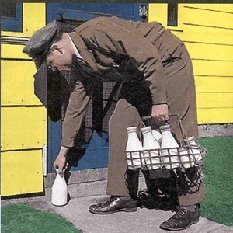 |
| Old fashioned milk delivery doesn’t make eco-sense! |
3. Bring back returnable glass bottles: NO! A milk-man came to my door offering a glass bottle delivery service a few times a week. I told him that I didn’t want it on environmental grounds – which rather surprised him. Why not? Just imagine if every item of our groceries was delivered in separate lorry – our butter, bread, fruit, meat, detergents etc. And then think about the weight of these goods if they were all packaged in sturdy glass bottles. It must be obvious that this isn’t a great solution from an energy perspective. The glass has to be thicker and heavier, so it doesn’t break – and then it has to be returned to base and washed at a very high temperature. I’m afraid, it makes more sense buying your milk in plastic bottles and putting them out for recycling – even better, if the bottles are made from recycled plastic.
4. Let’s buy more unwrapped fruit and veg: MOSTLY NO! People love this idea. It seems a no-brainer. Actually, it’s quite a complex issue. First you have to consider that you’re not simply eliminating the visible plastic – you want to reduce overall waste and energy too. If produce is being sold ‘loose’, it still needs protecting as you transport it to the supermarket and the customer still tends to put it in a plastic bag to take it away. But there are two further considerations. One supermarket tried moving to unpackaged fruit and veg and discovered that the in-store food waste increased by 50%, as people poked and prodded the produce to choose the best quality ones. Furthermore, there’s more food waste at home too. If you buy a cucumber in a plastic sleeve it will last several days longer than those without. That means it’s less likely to go rotten before you’ve had a chance to eat it – and so less waste.
Of course you will be now be asking ‘what should we do about this?’ It’s not so easy, but here are some pointers:
1. Look at the whole life cycle impact of our food distribution system to minimise waste and reduce carbon emissions: This means looking at what’s the best material to use for packaging both to and from stores, as well as minimising food waste.
2. Move away from our ‘disposable’ society with single use products, wherever possible – not just with plastics but paper and other materials too. One of my particular bug-bears is the incredible wastefulness of disposable paper napkins handed out with pretty well every food or drink product you buy, on the move.

3. Increase recycling by making it easier to recycle and making more products from recycled materials.This is not simply about collecting materials for recycling, but using waste to replace virgin materials for manufacturing products – and making sure the process actually saves energy and other resources.
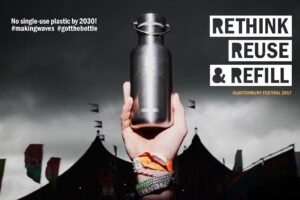 4. Take re-usable bags, re-fillable cups and anything else you need to avoid unnecessary waste: Lots of people are complaining about what companies are doing but don’t actually take steps to avoid waste themselves. It’s not only when you’re supermarket shopping, but when you’re buying clothes or any other goods – do you take extra bags with you? And, do you take a re-fillable water bottle with you when you’re out and about? I support charging for disposable bags but it should be for all bags, not just plastic ones.
4. Take re-usable bags, re-fillable cups and anything else you need to avoid unnecessary waste: Lots of people are complaining about what companies are doing but don’t actually take steps to avoid waste themselves. It’s not only when you’re supermarket shopping, but when you’re buying clothes or any other goods – do you take extra bags with you? And, do you take a re-fillable water bottle with you when you’re out and about? I support charging for disposable bags but it should be for all bags, not just plastic ones.
5. Move towards a circular economy.This means designing out waste from the system, so that the resources we use are continually re-used in different forms. For example, you can recycle mixed plastic waste into fascia boards, replacing rainforest wood – they last much longer and when they look tired, they can be recycled again.
6. STOP PLASTIC WASTE GETTING INTO OUR OCEANS.There are all sorts of reasons why this is happening and in my view stopping it has to be a huge priority.
I could go on and on, but I won’t. Remember, this isn’t simply about food packaging – we need to look at all packaging and all forms of waste.
 Going back to the Ellen MacArthur Foundation. They produced a well thought out report on what to do about the plastics problem – Blueprint to design a circular future for plastics. This is the sort of the research that the government should be looking at, rather than simply responding to well-meaning members of the public coming up with a lot of rubbish about taking our packaging back to supermarkets and dumping it at the till… That’s not going to achieve anything useful…
Going back to the Ellen MacArthur Foundation. They produced a well thought out report on what to do about the plastics problem – Blueprint to design a circular future for plastics. This is the sort of the research that the government should be looking at, rather than simply responding to well-meaning members of the public coming up with a lot of rubbish about taking our packaging back to supermarkets and dumping it at the till… That’s not going to achieve anything useful…
The most precious part of my day is between when I wake up (often quite early) and when I go down to breakfast. I read the paper, tackle a few bridge hands and listen to the radio. Today, I had half an ear on Michael Gove, talking about his environmental plan, when my sister rang. It was about plastics. Oh no… I didn’t like her idea and I certainly didn’t want to hear about it first thing in the morning! But perhaps she did me a favour because it fired me up to call the Jeremy Vine programme and write this blog…
Here are some of the recent links on what the government is doing – it’s not all bad, but the idea of plastic free aisles in supermarkets is populist nonsense.
– Theresa May urges supermarkets to create plastic free aisles.
– Government will consider 25p latte levy on disposable coffee cups
– Theresa May vows to eliminate ‘needless’ plastic waste
– Environment strategy aims to stop ‘needless plastic waste.


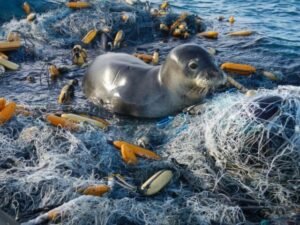


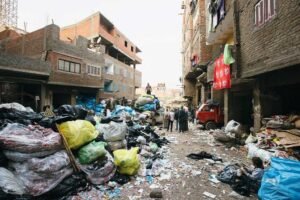
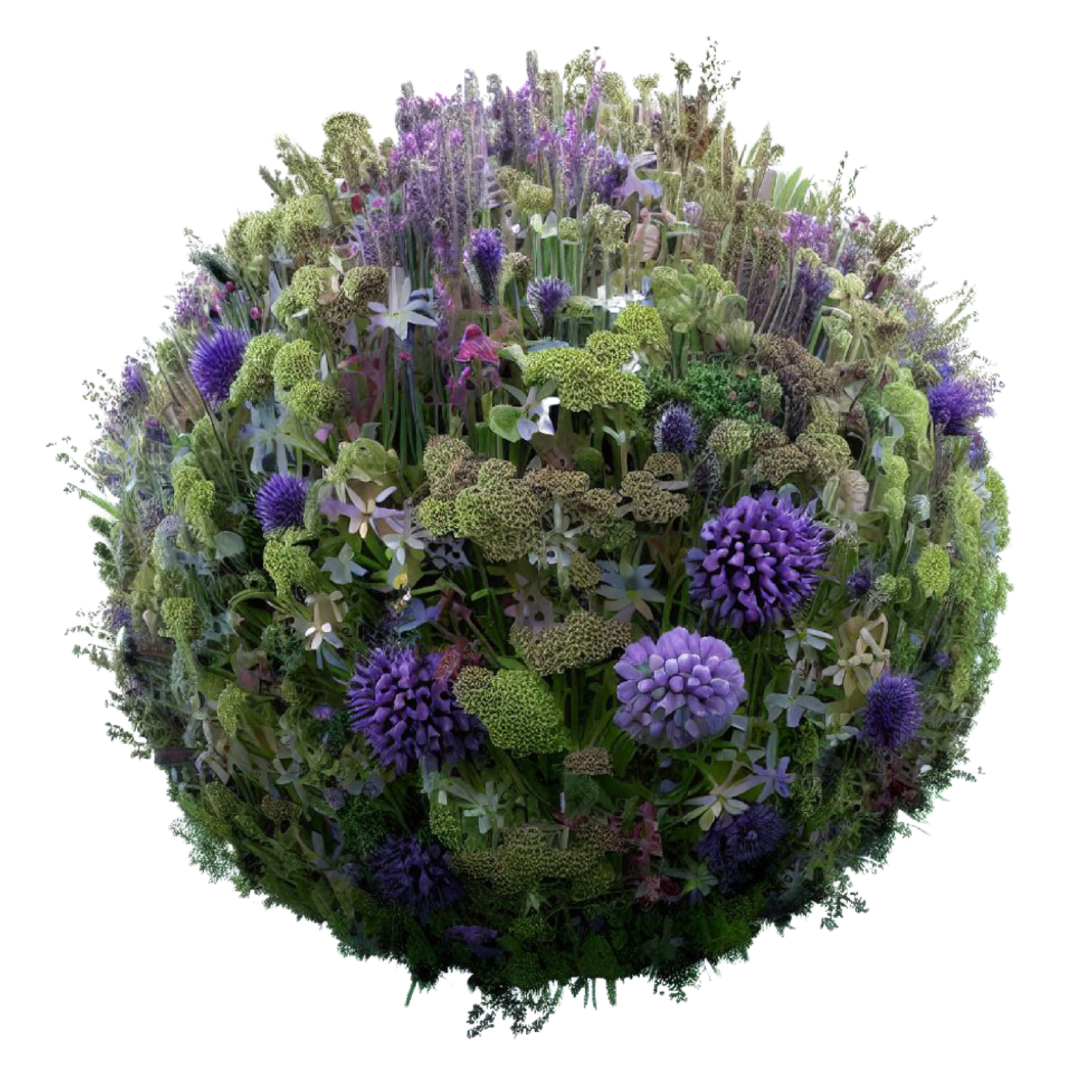

0 Responses
Wow….thought provoking and enlightening. Well done Julia.
Thanks Lisa. Was getting so frustrated by what I've been hearing on the radio, that I had to respond! Julia
Thanks for a well written comprehensive communication on this relevant, and often misplaced, topic of plastics and their sustainability.
Brilliant blog! Interesting the point about milkmen & food delivery – this implies that doing all your shopping with one behemoth supermarket is the most environmentally sustainable. Yet it is the supermarkets price wars and buying power that has forced farming down the chemical, high fossil fuel use, soil destroying path. As you say, full life-cycle analysis needed to ascertain honestly sustainable farming practices & food systems.
A comprehensive analysis, and debunking. I'd add 2 points.
Firstly, it is also down to each of us to address what we use and why. Cut unneccessary consumption etc, including of food so then we don't need to produce/pack/transport as much etc.
Secondly, remember that most "biodegradable" plastic is made from genetically modified corn starch – so try to solve one problem and create another!
Interesting post, thanks, it's got me thinking. I'm surprised paper bags take same amount of energy to produce as a plastic bag, anyone got a reference for this ?
Milkman. So long as the milk float is leccy and renewably powered i'm still in favour of glass milk bottles. Milk is the heaviest thing most of use buy so often needs a car if it's a big shop with lots of milk and running out of milk is often one of the main reasons for needing to go to the shops. A lot of energy is taken up with recycling plastic with a much higher carbon footprint than required for washing a glass milk bottle.
Points well made about biodegradable cups, big problem for recycling unless you collect them separately and compost them on their own – they take much longer than veg compost to become soil. We have just got Mendip DC to ban SUP's in their activities, we need a glass bottled, leccy powered milkman in Shepton Mallet…
A well written common sens approach to some of the hysterical knee jerk responses,
I really like having a hot bath, rather than a short shower – but I don't try and kid myself that it's the best environmental option. It isn't. Same for milk floats.
Thank you for sharing this insightful piece which debunks many of the misconceived alternatives to single use plastics. I did some work on the ban the bag campaign in Australia and found it really frustrating that the alternative to single use plastic bags were single use paper bags! They may appear more environmental/natural etc but it doesn’t take much thought to realise they’re not a good alternative. We should just be getting rid of single-use culture.
Could you please link the reference to the supermarket that experienced 50% increase in food waste? Many of the major supermarkets in Australia, along with independent retailers offer the majority of produce unwrapped.
Hi Alice – Agree about the frustration in people thinking that simply replacing one disposable item with another is a solution. And they often fight hard to hold on to their beliefs – as with previous comment from Shane Collins. If you want to know more about the supermarket increasing their food waste, you'll need to call me. It's a complicated equation of what makes sense in what situation. Julia
Thank you Julia for your analysis. I heard somewhere that most (90%?) of the plastic in the sea comes from 10 large rivers of less developed countries. Is this true? If so, how do we – the most 'developed' countries – play a part in reducing that. It feels like it is the preferred path of picking up your pension plan, analysing which of those companies have a hand in shipping plastic out there and threatening to divest from them. Any thoughts?
In my view this should be one of the top priorities. Identifying the source of rubbish that ends up in the sea and tackling that. As many of us are aware there are huge numbers of people in the world with no waste collection system available to them. Where does their rubbish go? On the roadside, in the waterways, dumped wherever they can. In Bamburi, near Mombasa in Kenya there are roadsides which are knee deep in rubbish – being rummaged about by goats and young children. Focusing our ire on food packaging in the UK, is pointless – particularly supermarket produce. Our society is wasteful and we should be tackling that – but lets focus on the most wasteful things we do, rather than the least.
Hi Julia. Lots to think about. I can see some interesting 'discussions' with well-meaning, but possibly ill-informed friends coming up… Meanwhile, I would be interested in your take on this project:
https://preciousplastic.com/
Hi RPJ – "Precious Plastics are great". At least that's what my son says! He's very enthusiastic about what you're doing. He's at Loughborough studying product design and is making a plastics shredder for 3D printing. He's called Connor Bryant – connor.cdcbryant@gmail.com and would like to be in touch. Any chance of sending him your email address etc? Yes, fully support plastics recycling initiatives and what you're doing – although haven't had a chance to see your video yet… Julia
Much as I'd like to take credit for PP, I am not involved directly – yet. But I will be taking full advantage of the splendid work of the founder, Dave Hakkens, and making some of the kit to help spread the word. Like Connor, I see a synergy between recycling plastic waste into 3D printing filament – well, I imagine he has thoughts in that direction. I also have colleagues in the festival waste business who will be touring a PP installation around the festival circuit to reduce and even add value to waste generated on-site. I doubt I can help Connor much now, but I will email him anyway – always good to have contacts 🙂
Really interested in this – is there no benefit that the milk-person is delivering to a number of people on a route, plus social interaction etc? I do appreciate that few people go to the shops for just milk, but equally milk deliveries do deliver other things at the same time. Would an online grocery delivery be better than going to the shops yourself? I definitely agree that people need to take personal responsibility for reducing their impact, but equally companies need to be driven to consider their products and packaging. Thanks for throwing the stone in the pond to make the ripples start…
Sorry but Julia you obviously don't live in the back of beyond like some of us in rural areas. A 5 mile round trip to nearest small store, 25 mile round trip to nearest big supermarket means that our milkman is a lifeline to us older folk, particularly in icy winters. His 3 visits per week mean I only have to drive to shops once every 10 days or so (saving all that transport pollution) and his round takes him 30 miles to many rural households. There is no way I could store that much milk at home even though I have a fair sized refrigerator.
Paper bags may not be the answer in the long term, but it doesn't hurt to wean people off plastic bags in the meantime. And they can be recycled (and in our house often used several times) before being shredded and added to the compost heap.
You're wrong! I do live in the back and beyond and in a very rural area – even further from the shops than you… Your milkman may be your lifeline but that doesn't make him the best green option. Milk lasts at least a week in the fridge – probably longer. And you can freeze it. The best eco-solution would be to have all your food delivered once a week, including milk – as per comment above. Far less transport all round. However, I do understand that you might like going to the shops and seeing your milk person – so it could be better for you, but not better for the environment. I do get my groceries delivered and only really go to the shops for anything if I'm combining it with other tasks. However, I don't want to set myself up as a paragon of all virtue, except in regards to not supporting milk floats. Julia
I work for a company that specialize in sourcing and supplying packaging to the produce sector.
We are proud of some of the work we have done to reduce plastic and paper into the industry (often this has been done by down-grading, the motive has mainly been driven by price).
My colleagues and I have forwarded your blog to several of our customers and it has been universally well received and often sighted as “a voice of reason”.
As a commentator which direction would you like to see the industry move? The options for fruit like strawberries seems to be increasing by the day.
· Continuing to use Plastic Punnets (made from 70-80% recycled material from the Kerbside)
· Pulp punnets made from 100% recycled paper
· Sugar cane punnets
· Punnets made from bi-products of the Potato industry
· Plastic punnets with a biodegradable additive
· I have also seen Carton-board and small corrugated punnets discussed
There are many Produce suppliers looking to make instant changes and to be honest I think they are looking for the 1st lifeboat that they see without necessarily looking at the bigger picture. Your comments on the subject have helped some of these customers take a more measured response. It is still frustrating that the original spirit of the initiative “to look at the unnecessary use and the type of plastic that we use” has been interpreted as “stop using all plastic on food” with little regard for all the other uses that plastic is put to and the vast array of materials that do not/ cannot be recycled.
Again thank you for your blog.
Here's a letter written to the Telegraph a few days ago:
Put it in plastic
SIR – As someone who is proud to have worked in the packaging industry, I am astonished at the unscientific claims by those who seek to persuade us that plastic packaging need be bad.
Modern packaging using plastics has helped reduce food spoilage in the industrialised world to around 2 per cent, in contrast to 30-50 per cent in developing countries.
I wish to have presentable food that can be stored safely. Plastic packaging delivers just that.
A V Freer
Leicester
I heard an interesting programme on Radio 4 Life Scientific a while ago. Professor Dame Julia Higgins on polymers. all of the programme was interesting but, to me, especially very near the end (26 mins)where she talks about producing energy from waste plastic…..could this lead to 'mining' in landfill sites? http://www.bbc.co.uk/programmes/b083n2jg
I found this link about increase in food and packaging waste for supermarkets selling loose produce. It isn't the original research I was referring to, but gives the same perspective. https://www.thegrocer.co.uk/home/topics/waste-not-want-not/why-did-asda-decide-to-stop-the-sale-of-loose-fruit-and-veg/553281.article
Friends of the Earth, Wrap and others have done research on the impact of glass vs plastic and found that if glass is reused 5 times it is less energy intensive than a plastic bottle: https://friendsoftheearth.uk/plastics/plastic-or-glass-milk-bottles-crate-expectations
Hi Annaf,
Read the article and was surprised that the graphics seemed to illustrate that HDPE milk bottles are more efficient for single trip by at least 2.5 times, and for 5 trips, for 20 trips and for 50 trips – by lesser amounts. So conclusions don't tally. However, it is true that glass is more infinitely recyclable than plastics.
The analysis also picked up on transport issues explaining that glass is much heavier than plastic, but then tried to promote glass milk bottles on the basis that the milk in returnable bottles is more often local and MAY come in electric milk floats, which MAY use renewable energy. That's a tenuous argument. Clearly, if you buy your HDPE milk bottles from the supermarket you can pick them up with all your other groceries, so no separate trip is necessary – and plastic bottles are light weight.
The article reinforces my view that returnable milk bottles sound like they're a good environmental option, but they're not.
This is an inconvenient truth!
Julia
I’m currently re reading your book and just read this blog post. I’m not entirely in agreement. Walking around the newly opened Lidl store in my home town (Buckingham) I found that just like Tesco and Waitrose virtually every type of foodstuff is encased in plastic. This is replicated everywhere in the UK and around the world. The amount of plastic with food/cleaning/other products bought every single day worldwide is quite frankly frightening. All in the name of convenience. Glass and paper are reusable and created from renewable sources. With the very lazy world we live in and as can be clearly seen pladtic in particular is disgarded, doesn’t breakdown – just chokes the environment and ultimately the planet. It’s now such an environmental disaster that I think we need to completely rethink how we feed ourselves. We need plastic free shops – not just plastic free aisles! We need (where we are able) to grow our own food. We need to understand that we are putting convenience above the future of the planet. And of course we should be generating our own energy for consumption via wind, sun and water – but that’s another subject!
Hi Hilary, Thanks for your comment. I’m afraid that glass and paper use a huge amount of non renewable energy. Four times more energy to make a paper bag than a plastic one – and you need 10 times more lorries to transport them because they’re bulkier too. And six times heavier. Working out the best environmental option is not always easy – you have to take account of a whole range of issues throughout the life cycle of the product, from cradle to grave. This includes how you use it. Plastic is often the best environmental on many counts – but, of course is a nightmare if it ends up in the sea. However, you don’t want to design packaging to go in the sea. The challenge is how to stop it getting there. We’re promoting closed loop systems, so you get the benefit of using light-weight, energy efficient systems – but make sure they’re recycled again and again.
Thanks, it is quite informative